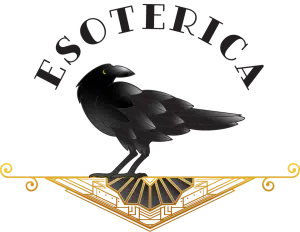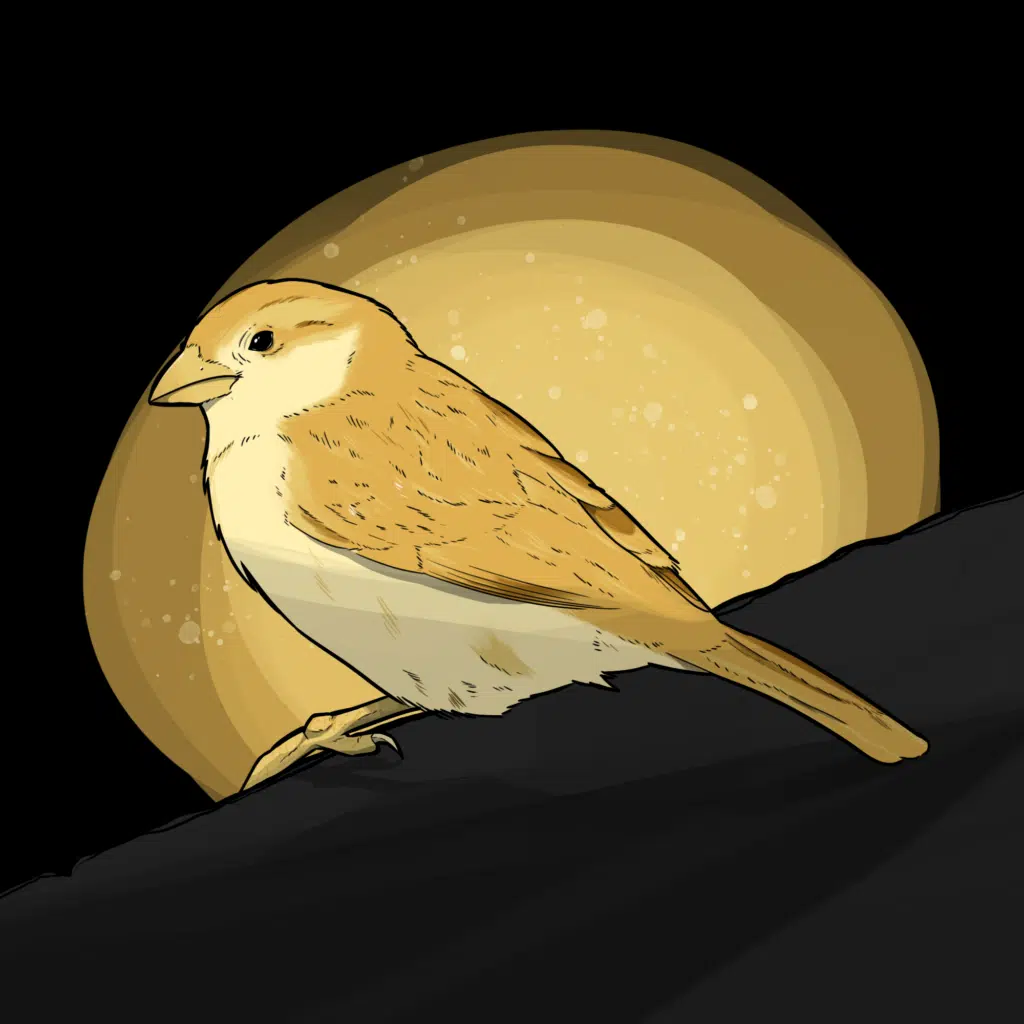By Jennifer Frost
Rain fell on the roof of the cottage where Harriet lived with her parents. She sat at the window while they bickered in the kitchen. “Thin soup again,” said Father.
“Earn more; we’ll eat better.”
“A good wife makes the smallest sum suffice, stupid woman.”
The rain on the roof said, “Harriet, I’m at the garden gate.”
Harriet ignored the voice and passed a quarrelsome evening at home. When she asked for butter, Mother smacked her. “We have no butter, Fool. Why ask and humiliate me?”
In bed, Harriet heard the rain falling. “Meet me at the gate at dawn,” it said. Harriet left the house early, a string bag over her shoulder. On the gatepost, a sparrow stood hopping and chirping. Harriet followed it from tree to tree, winding along the lane, until they came to a marshy place.
There, a ferryman waited, a lantern on a pole behind him, mist rising from the swamp. “One coin to cross,” he said.
“I have no coin and no wish to cross.”
“Move on, then.”
The sparrow lit atop the lantern pole to groom its feathers and jerk its head to the far shore. “I shall cross after all,” said Harriet, “And instead of a coin, I will give you this lion’s tooth.” She offered a long yellow incisor hung on a leather string. “My father traded for it in the marketplace, a totem of courage and valor. One night, as he snored before the fire, I stole it. Since then, I wear it for bravery.” The ferryman accepted and stood aside as Harriet boarded.
Passing through the reeds Harriet saw, submerged in the shallows, a sleeping girl. Hair swirling in the ferryman’s wake, the maiden smiled to herself at her own sweet dreams. On the bog bottom lay another world, pond grasses swaying in a forest of roots and branches.
The craft bumped firm ground. The ferryman handed Harriet ashore with a stern word. “I leave you in a cursed kingdom whose unjust ruler prides himself on his cunning. Be on your guard.” The sparrow perched on the branch of an elm overlooking a path into green fields and golden meadows. Harriet thanked the ferryman and shouldered her string bag.
The path became a track, the track became a road, the road became a street, and soon Harriet found herself at the palace gates. The sparrow rested on the battlements, calling over the din of the town. “May I enter the palace?” Harriet asked.
“No one may enter whom the king has not summoned.” The sparrow disappeared over the wall.
“I am expected,” said Harriet.
“Not by His Majesty.”
“I bring a gift.”
“What gift?”
From her string bag, Harriet drew a fine prayer book bound in gilded leather. “I received this from the bishop at my First Communion. I wish to give it to His Highness for comfort in these trying times.”
The guard inspected the volume, its soft vellum pages, and intricate illuminations. “I accept this gift on behalf of the king. An attendant will prepare your room.”
Harriet crossed the courtyard to a room with rich hangings and a bright fire. The sparrow, entering the window, landed atop a lavish mirror. Harriet shook out her clothes and straightened her hair. “You are as plain as a rag doll,” said her attendant before retiring. “His Majesty will see through you; better keep your wits.”
Harriet faced the mirror, wondering how she might improve herself. From above, the sparrow shook its wings, dropping gilded feathers among the combs and brushes. Its beak was full of silver ribbons and strings of pearls. These it wove into ornaments for Harriet’s hair and adornments for her drab clothes.
In the throne room, the king admired young Harriet, as elusive and lovely as a bird. “Dear Maid, why do you come before me?” he asked.
“I bring a gift, Your Majesty.”
“A gift?”
“I left it at the gate.”
The king folded his hands and leaned forward on his throne. “I’m told your name is Harriet and that you are a maiden. Is that right?”
“Yes, Majesty.”
“I am a king in need of a maiden to carry sons and secure my line. As such, I declare you will marry me.”
“I will not, Sire.”
“No?”
“You are unknown to me, Your Highness, and I’ve heard talk of a curse in your kingdom.”
“There is a curse,” said the king, “A vile dragon who lives above us in a mountain cave where he hoards treasure and demands a maiden to devour, lest he destroy my kingdom.”
Harriet trembled but kept her composure. “I thank Your Majesty for this audience,” she said. “Let me trouble you no longer.” She bowed to leave.
“Young woman, you may not refuse my proposal,” said the king, “But because you are fair, I grant you a chance to save yourself. You have three days and three nights; each morning you must set me a riddle. If you outwit me, you are free to go. But if I solve your riddles, you belong to the dragon and my kingdom is free from its curse.” A whisper went among the courtiers at this pronouncement. There could be no riddle clever enough to confound their sharp-witted king.
Guards whisked Harriet back to her room and left her to consider her fate. She wept, the sparrow at her pillow, knowing nothing of riddles or any way to avoid her doom. She pondered death and railed at the sparrow whom she’d followed to this cursed kingdom. When the storm of her crying passed, she was tired, but it was time to present the king with her first riddle. She missed the lion’s tooth, once worn round her neck for courage.
In the throne room, rain spattered the leaded windowpanes. The sparrow settled itself on a finial of the throne. “What riddle do you have for me, Maid Harriet? No doubt I will solve it in an instant.”
At this, the rain spoke to Harriet, tapping the roof and walls. She repeated every word it said. “Your Majesty. A murderer condemned to death must choose from among three rooms. One is full of raging fires. One harbors traps rigged with poison darts. The last is a den of lions, starved for three years. Which room should the prisoner choose?”
The king’s eyes flashed. “You must do better than that to outsmart me, dear girl. Of course, the prisoner must choose the lions’ den, since the animals died of starvation.”
The sparrow flew from the room as guards led Harriet away. Sobbing into her pillows, she despaired. If the king solved the rain’s riddle with such ease, nothing she might contrive could save her. She prayed through the night, missing her First Communion prayer book, begging guidance and mercy from God. At dawn, a miracle. A riddle came to Harriet at the washbasin, an answer to her prayers. Perhaps with divine inspiration, she might fool the shrewd king.
“What is your riddle, Maid Harriet? I hope you’ve brought something worthy of my intellect.”
Harriet stepped forward. “Your Royal Highness. I am greater than God and worse than the devil. The poor have me, the rich want me, and if you eat me, you’ll die. What am I?”
The king reclined on his throne, fingers to his beard, rings flashing in the morning light. He leaned to a golden table at his side where Harriet’s gilded prayer book lay; he took it up and thumbed its pages. “You impress me, dear girl. This is a better question. And yet you have given me the answer.” He held up the prayer book. “An apt gift for a king with perils at his doorstep. From it, I learn nothing must be the answer to your riddle. For nothing is greater than God or worse than the Devil. The poor have nothing, the rich want nothing while eating nothing leads to death.”
Guards again whisked Harriet away, the king chiding her to do a better night’s work if she hoped to live. In her room, Harriet burned candles one after another, pacing before the fireplace. A hundred ideas came and went, but nothing to save her life. The sparrow had gone and did not return while Harriet scribbled her efforts in vain. In the morning, she hadn’t slept and saw no sign of the sparrow.
“Maid Harriet, today you must save your life or go free; either way, we will be parted. Can you outwit me?”
“Your Majesty, I have no riddle.”
“No riddle? I’m disappointed. You’ve exhausted your chances.”
In a rush of air and soot, the sparrow appeared from the chimney, its feathers singed and beating as it swooped around Harriet’s head. “My Lord,” she said. “I know a riddle. Tell me, what is easy to lift but hard to throw?”
The king looked at Harriet with a furrowed brow. “A question so simple won’t do, dear Harriet.”
“Sire, what is your answer?”
The king frowned and rose to pace before his golden tapestries. First an hour, then three, then six hours, Harriet waited, the courtiers drooping as the sun shifted across the sky. At last, the king cried out. “The answer, girl! I must have the answer.”
“Does Your Majesty mean he cannot solve the riddle?”
“I have solved it. Tell me your answer and I will tell you mine.”
“Free me, Your Majesty.”
“My answer will prove correct, and you will go to the dragon.”
“You do not know the answer,” said Harriet. Guards reached for her, but Harriet felt the sparrow alight on her shoulder. Under its feet she transformed into a breeze which flowed out through the window, a feather falling to the floor in her place. The court gasped, and the king raged. He grasped the feather and threw it with all his strength, only to see it spiral and fall.
“A feather,” said the king, the answer coming too late, leaving him to search for another maiden with which to save his kingdom while Harriet found freedom and lived content for the rest of her days.
Jennifer Frost lives in Woodland Hills, CA with her husband & 6-year-old son. With an undergraduate degree in English Literature from the University of Iowa, Jennifer has spent her life as a devoted reader & secret writer. You can find her stories in Backchannels, Deracine & East of the Web. Visit www.jennniferfrostwrites.com for stories, articles, and book reviews.

